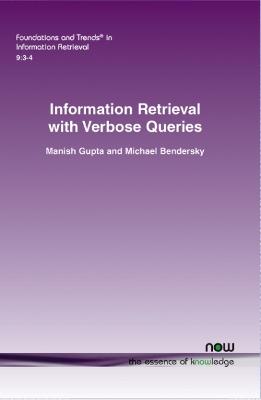Foundations and Trends (R) in Information Retrieval
1 total work
Information Retrieval with Verbose Queries
by Manish Gupta and Michael Bendersky
Published 31 July 2015
Information retrieval with verbose natural language queries has been generating a lot of interest in recent years. The focus of many novel search applications has shifted from short keyword queries to verbose queries. Examples include question answering systems and dialogue systems, voice search on mobile devices, and entity search engines like Facebook's Graph Search or Google's Knowledge Graph. However, the performance of textbook information retrieval techniques for such verbose queries is not as good as that for their shorter counterparts. Thus, effective handling of verbose queries has become a critical factor for adoption of information retrieval techniques in this new breed of search applications.
Over the past decade, the information retrieval community has deeply explored the problem of transforming natural language verbose queries using operations like reduction, weighting, expansion, reformulation and segmentation into more effective structural representations.
This is the first monograph to provide a coherent and organized survey on this topic. It puts together the various research pieces of the puzzle, provides a comprehensive and structured overview of diverse proposed methods, and lists several application scenarios where effective verbose query processing can make a significant difference.
Information Retrieval with Verbose Queries is a very timely reference on this important topic. It is entirely based on previously published research and publicly available datasets and as such, it should prove useful for both practitioners and academic researchers interested in reproducing the reported results.
Over the past decade, the information retrieval community has deeply explored the problem of transforming natural language verbose queries using operations like reduction, weighting, expansion, reformulation and segmentation into more effective structural representations.
This is the first monograph to provide a coherent and organized survey on this topic. It puts together the various research pieces of the puzzle, provides a comprehensive and structured overview of diverse proposed methods, and lists several application scenarios where effective verbose query processing can make a significant difference.
Information Retrieval with Verbose Queries is a very timely reference on this important topic. It is entirely based on previously published research and publicly available datasets and as such, it should prove useful for both practitioners and academic researchers interested in reproducing the reported results.
